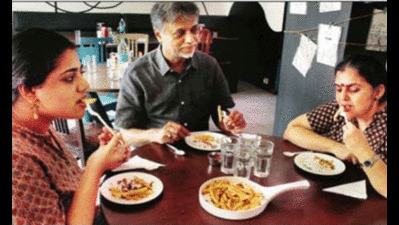- News
- City News
- chennai News
- Spoons of jowar, bowls of bamboo
Trending
This story is from April 24, 2016
Spoons of jowar, bowls of bamboo
The experience of relishing an ice cream or a cup of coffee just got a green makeover with the coming of edible and biodegradable cutlery.

The experience of relishing an ice cream or a cup of coffee just got a green makeover with the coming of edible and biodegradable cutlery.
The experience of relishing an ice cream or a cup of coffee just got a green makeover with the coming of edible and biodegradable cutlery. Whether it is a lunchbox made from rice husk or a soup spoon made of millets, environment-friendly alternatives to traditional crockery are becoming popular in homes and at events. These innovative substitutes may also transform the food take-away industry by reducing plastic waste.
"Plastic is meant for one time use.If reused, the food gets contaminated with chemicals and people end up consuming toxins and germs," says Narayana Peesapaty, founder of Hyderabad-based Bakeys Foods, one of the pioneers in making edible cutlery. Made from jowar, rice, wheat and hot water, the baked spoons are considered healthier. Apart from decomposing easily the spoons can also be eaten after use. "Since the spoons are made from millets, they have a low glycemic index and are good for diabetics," says Dr Vasundhara Kamineni of Kamineni Hospitals. For Chennai-based cater ers like N Sridhar of Arusuvai Arasu Caterers, using edible spoons has reduced the plastic waste generated during wedding buffets. "People are amused when they are told that the spoons can be eaten, and they all try it and so there is no waste," he says.
The other forms of biocutlery , which aren't edible, have also helped some restaurants replace flimsy plastic spoons and containers with green alternatives. For instance, Ecolife in Chennai makes cutlery from polylactic acid sourced from plants."They reduce your carbon footprint by nearly 80% but their lifetime is as long as plastic.When placed in composting conditions, they take about 80 to 120 days to decay," says Goutham, founder, Ecolife.
Bagasse, a by-product of sugarcane pulping, and bamboo fibres are more versatile when it comes to designing crockery. "After preparing a kind of pulp from these raw materials, they can be put into moulds of different shapes and sizes. They are more sturdy and aesthetic," says Abhishek Agarwal of Pappco Greenware, which makes single use and reusable crockery from bagasse and bamboo fibre.
"They are safer alternatives for children too as they don't release chemi cals like bisphenol A," says Harika Meka of SaveGlobe, a Bengaluru-based firm that makes edible cutlery and biodegradable crockery.
However, companies say that the premium price of these eco-friendly products is a problem. "A plastic spoon costs 40 to 80 paise whereas an edible spoon is priced at about Rs 2.75. There needs to be more awareness about the environmental and health benefits of these products," says Harika.
"Plastic is meant for one time use.If reused, the food gets contaminated with chemicals and people end up consuming toxins and germs," says Narayana Peesapaty, founder of Hyderabad-based Bakeys Foods, one of the pioneers in making edible cutlery. Made from jowar, rice, wheat and hot water, the baked spoons are considered healthier. Apart from decomposing easily the spoons can also be eaten after use. "Since the spoons are made from millets, they have a low glycemic index and are good for diabetics," says Dr Vasundhara Kamineni of Kamineni Hospitals. For Chennai-based cater ers like N Sridhar of Arusuvai Arasu Caterers, using edible spoons has reduced the plastic waste generated during wedding buffets. "People are amused when they are told that the spoons can be eaten, and they all try it and so there is no waste," he says.
The other forms of biocutlery , which aren't edible, have also helped some restaurants replace flimsy plastic spoons and containers with green alternatives. For instance, Ecolife in Chennai makes cutlery from polylactic acid sourced from plants."They reduce your carbon footprint by nearly 80% but their lifetime is as long as plastic.When placed in composting conditions, they take about 80 to 120 days to decay," says Goutham, founder, Ecolife.
Bagasse, a by-product of sugarcane pulping, and bamboo fibres are more versatile when it comes to designing crockery. "After preparing a kind of pulp from these raw materials, they can be put into moulds of different shapes and sizes. They are more sturdy and aesthetic," says Abhishek Agarwal of Pappco Greenware, which makes single use and reusable crockery from bagasse and bamboo fibre.
Most of these eco friendly options have also friendly options have also inched their way into households as they are microwaveable and make waste segregation easier.
"They are safer alternatives for children too as they don't release chemi cals like bisphenol A," says Harika Meka of SaveGlobe, a Bengaluru-based firm that makes edible cutlery and biodegradable crockery.
However, companies say that the premium price of these eco-friendly products is a problem. "A plastic spoon costs 40 to 80 paise whereas an edible spoon is priced at about Rs 2.75. There needs to be more awareness about the environmental and health benefits of these products," says Harika.
End of Article
FOLLOW US ON SOCIAL MEDIA










